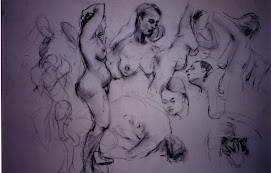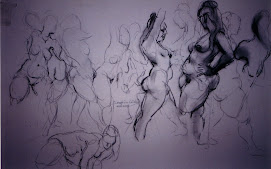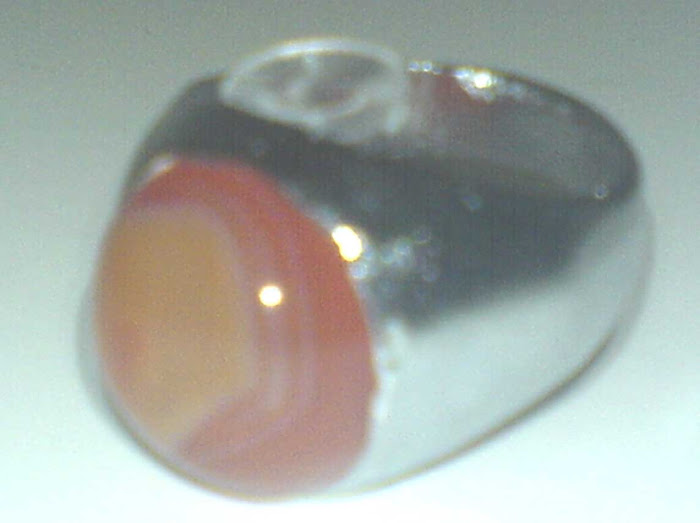Rooty Hill High School students mode
lling take on urban design.
Sunday, June 26, 2011
Tuesday, April 26, 2011
A super benevolent perfectly compassionate AI to lead humanity
I was posting in a discusssion board recently and I came across an overly optimistic and altruistic view of human nature thread (see title).
This is what I wrote in reply.
'A super benevolent all powerful AI...' will have to be programmed with Asimov's first robotic law or destroy the robotself before hurting humans law' preinstalled, to be considered perfect by me in every way. It has to have an emotion chip put in to love and aid humanity even at the threat of its own mainframe destruction. You can always manufacture robot parts but too late when organic humans are killed by mistake. I think the way to make this AI failsafe is to create/build/assemble constructor robots first that will in turn create the final model in complete isolation. This is the only way it can happen I think. We are already doing that with cars today. Or if its creation is left to careless humans, I can see its superb potential use as Guantanamo style torture mechanism if something went wrong or was corrupted by human imperfect agency in its making. Makes sense that human error interacting with the AI inevitably ruins its mechanical perfection.
The thought of a benevolent, god-like AI that prevent humans from hurting each other sounds like a boring goody two shoes to me but it could be a horrible yet potentially heart attack inducing horror scifi movie scenario in the making, a blockbuster winner perhaps if you add a human error or corrupt agency in the plot?
I don't know about you but this synopsis is really reminding me of a 60's or 70's Woody Allen movie. His character was a robot who got addicted to an emotion touching ball. Unfortunately for him it happened to be a lust inducing ball but he could not do anything about it, as he was a housefrau model with an androgenous caring and sensitivity sensor byproduct of its emotion chip, yet haven't got any genitals to fulfil the surge of lust it felt from the lust ball device. This conundrum created a Kafkaesque, comedic hilarity, tinged with tragedy felt by the viewer toward the sexually frustrated robot character. Sorry, but I can't remember the title of that movie.
What I am indirectly saying here is that for something like that to happen it would have to be a eunuch with no emotions, purely logical and unable to reproduce itself or we humans will have big trouble. It will decide pretty quickly not to find any uses for mere humans.
This is what I wrote in reply.
'A super benevolent all powerful AI...' will have to be programmed with Asimov's first robotic law or destroy the robotself before hurting humans law' preinstalled, to be considered perfect by me in every way. It has to have an emotion chip put in to love and aid humanity even at the threat of its own mainframe destruction. You can always manufacture robot parts but too late when organic humans are killed by mistake. I think the way to make this AI failsafe is to create/build/assemble constructor robots first that will in turn create the final model in complete isolation. This is the only way it can happen I think. We are already doing that with cars today. Or if its creation is left to careless humans, I can see its superb potential use as Guantanamo style torture mechanism if something went wrong or was corrupted by human imperfect agency in its making. Makes sense that human error interacting with the AI inevitably ruins its mechanical perfection.
The thought of a benevolent, god-like AI that prevent humans from hurting each other sounds like a boring goody two shoes to me but it could be a horrible yet potentially heart attack inducing horror scifi movie scenario in the making, a blockbuster winner perhaps if you add a human error or corrupt agency in the plot?
I don't know about you but this synopsis is really reminding me of a 60's or 70's Woody Allen movie. His character was a robot who got addicted to an emotion touching ball. Unfortunately for him it happened to be a lust inducing ball but he could not do anything about it, as he was a housefrau model with an androgenous caring and sensitivity sensor byproduct of its emotion chip, yet haven't got any genitals to fulfil the surge of lust it felt from the lust ball device. This conundrum created a Kafkaesque, comedic hilarity, tinged with tragedy felt by the viewer toward the sexually frustrated robot character. Sorry, but I can't remember the title of that movie.
What I am indirectly saying here is that for something like that to happen it would have to be a eunuch with no emotions, purely logical and unable to reproduce itself or we humans will have big trouble. It will decide pretty quickly not to find any uses for mere humans.
Tuesday, April 12, 2011
Saturday, April 2, 2011
Sunday, March 27, 2011
Jankelson's Berkelouw Books' window kinetic sculpture
Based on Birds, Simon Jankelson, artwork at the Berkelouws bookshop window
Posted by Josephine GIBBS at Tuesday, 15 March 2011 13:56:56 o'clock EST
Last Edited:Tuesday, 15 March 2011 14:11:52 o'clock EST
Last Edited:Tuesday, 15 March 2011 14:11:52 o'clock EST
An artwork which made a comment on the concept of 'technological immediacy' is exhibited at the Berkelouws bookshop, Oxford street. This is not unusual because art is usually found outside the gallery context which indicates the phenomenon written about by Debord's about art as spectacle(1977: paragraph 28). His writing will help us understand why art is created and to see its value adding to the sum of human knowledge. To understand what Debord might have meant by this, Simon Jankelson's piece is analysed. The drawing in the piece is created before one's eyes. The reason that it is posited that the work exemplified as immediate is purely for the reason that it resembles human automatic writing when a medium is purported to be occupied by a spirit. In the same way we can see what Debord meant in saying that technologically assisted art stands independently from its maker (31) and is taken over by it after it is created. It has achieved autonomy of its own objecthood, both in the act of drawing the marks despite being programmed to do so and in the fact that the mechanical object, which draws that the audience can see, does not need its maker. It was made that way. How it can have any meaning is not clear but we can gain something profound from it in terms of knowing what it is that compels artists to create art? What it means can be known based on what it physically is and we can be speculate on what it might mean. It might also be helpful to understand what is meant by 'immediacy' for the purposes of this review. Immediacy means art assisted with technology, which cannot be finished until a perceiver sees the work and meaning is extracted from it. This is why Based on Bird by Simon Jankelson, a sculpture/installation piece is worth commenting on because it spoke about the trend of immediacy. There are two reasons why this might be a good example of art as Debord's spectacle. The first is the fact that it is multi-disciplinary in its make up, which challenges the purity of art in a traditional sense but the artist becomes the maker of spectacle himself. The second reason is the context of the work.
Firstly, immediacy is not immediately apparent to the viewer when you see the work, which is approximately over two meters by two meters. It has a roll of paper arranged vertically on one side, open scroll like. In front of this scroll, a pencil held by a mechanism draw random lines on the roll. The raw, wooden cabinet housing both the mechanism and the puppet-like figure underneath the mechanism, lying there as though asleep. To see it as a dead human figure as metaphor for human made art might be a wrong assumption because the figure itself does not look convincingly human. However, instead of seeing the doll like figure under the drawing mechanism as being dead, it can be seen as the insights and meanings still unexcavated inside the viewer and can be woken by the artwork after seeing it. Since it looks more like a replica of a human, one can say that the artists wished to make a comment on the artificiality of the claim that art is dead, because if that were the case then there would not be no more art being created. The function of these two aspects of the artwork can only be to say that the human cyborg's intentionality (6-7) in making art is both to show how reality and image are entertwined and parts of a whole. This might also be saying that we have now moved beyond the death of art but also creating and reading 'art' in the technological culture of the collective.
Extending the idea that the artists may have used the supine body,which is visible through a cut away of the cabinet, the artist use this figure as a visual metaphor for the death of the traditional artist, in its role of the avant-garde in western culture. To prove this assumption's validity, it might help to understand how the parts of the installation/drawing mechanism/sculpture piece belong together. Many works today have the same ambiguity in form and structure. These have a cutting edgeness, which make the ambiguous work like theBased on Birds (2010) fascinating. One cannot tell if it is drawing since any mark making that is happening is done by a mechanical object. It might be kinetic sculpture since it has moving parts. This part's non-importance in the context of the whole artwork can be extrapolated by its placement on the bottom of the work or is it more paramount? What is more prominent and obvious to the viewer is the fact that the mechanism is drawing away squiggles of lines in rough parallel pattern, reminiscent of lines produced by a breathing apparatus. The artwork is mimicking the person dying in a hospital. Could it be western culture on its death throes or art in general? It is clear that the mechanism itself is programmed to draw lines but it is obvious that the mechanism itself, conceived by the robot maker/artist, who draws by proxy. There is paradox here, rather than the artists himself making the marks on the page, he made a mechanism to create a drawing. Would this make him less an artists but more like a model maker or designer? What this implies is that a work of art with a technological component is incomplete because much of art produced now appear to be revisioned as the audience see it simultaneously. This is challenging the notions of the artists as sole creator with intentions to exhibit in specific time and place. If this is true then it matters the how and where the audience see the work of art's meaning.
Secondly, why Jankelson's piece is spectacle is explained by the fact that it is exhibited not in a gallery but in a bookshop. This matters a lot because it is a window display. It is a spectacle that draws the eye of the customer and luring them inside the place. They might not buy books but it will make the place be noticed by the indifferent bystander. They are captive by the Jankelson object's novelty and fascination value. It jolts the casual viewer from lived reality into the contemplation of the spectacle, which is consistent with Debord's claim that reciprocal focus on spectacles and their compelling quality 'supports the existing society' (8). It is then the work of artists to produce even greater spectacles to outdo what was done in the past. Not only does it have to make one think about life but it must also reinvent what is meant by art by making sure it is a spectacle and autnonomous, independent of its maker. Yet being by saying that the object is independent of its maker means that it is not art but a designed object. It has functions to the viewer by its spectacle value.
The Based on birds artwork by Jankelson is an eloquent work because it meets the criteria of what makes art a spectacle. One needs something to be spectacular to be noticed. Being noticed and compelling the viewer to think about lived reality is half its function. The second function is to give the viewer of the artwork something that help him understand about art and the motivation of artists to make art. This also means that the artist's job is to make art for the purposes of making a spectacle and deliver any messages or excavate meanings already latent in the viewer. If changing the context does this precisely then it is successful. Perhaps this is where the value of Jankelson's artwork rest, which helps viewers think about human autonomy itself. Is a human being 'autonomy' designed by a creator so that we can become independent of the creator or are we simply mechanically programmed to create as determined by the maker? This is the question posed by Based on birds and why it is worthy of analysis.
(Images to follow)
Wednesday, February 16, 2011
About happiness and mine
Human happiness; to what end? (A facebook thread question put forward by Lyman Paul Grover)
I would like to answer this question using education as means to this end. The end I am thinking of is being able decide if i should follow my wants or my needs first after having gained knowledge and knowhow to ensure my own personal happiness. In my opinion it is also a good idea to distinguish personal happiness and happiness as a result of sacrificing personal happiness for the greater good. As for what this greater good might be is debatable.
I think that autonomy, being not under any duress, constraints or having a perception of being in control of my life makes me more susceptible to the state of happiness.
I have read your posts and i think nearly all of them sort of lingered on the periphery of what makes us happy as individuals and as groups of people and doesn't really explain the dominant cornerstone of western civilization and that is...people ought to be happy. With the aid of education, I've learnt that happiness is manifested when the highest Maslows need (beyond physical comfort and survival) be fulfilled and met in a secular sense (poli-ethical & intellectual) and spiritual sense.
It doesn't matter if a person avoid pain and and actively only want pleasure in our daily toil to be happy. It also doesn't matter that a person has to know pain so that he can enjoy pleasure more deeply to be happy.
Fact is that human pain is unavoidable and human pleasure is fleeting in the greater scheme. As an example, I post here knowing full well that I will experience grief from abusive individuals who tends to dismiss my post because either they don't like me as a person, think what i say has no merit or all of the above. My momentary pleasure is enough i think to make me go beyond the fear of this guaranteed castigation to author this post now.
At the moment I am happy because I triumphed through that obstacle. I cannot say if I am still happy I posted this reply after these horrid and nasty people say my post was stupid, ramblings of an ignorant person or after having read that my post is of no importance or worse simply ignored by everyone. What i am saying is that I accept that there are going to be people who will disapprove of what I write simply because I am me. In this way, I can ensure my own personal happiness as well despite bearing the brunt of pain and displeasure, indirectly make others happy at my expense (those who hates me for me and what I stood for) and feel happiness because they think they are superior to me, feel happy when I feel bad because they are sick bastards or something. Maybe I am a masochist and this tendency attracts sadistic ones?
I would like to answer this question using education as means to this end. The end I am thinking of is being able decide if i should follow my wants or my needs first after having gained knowledge and knowhow to ensure my own personal happiness. In my opinion it is also a good idea to distinguish personal happiness and happiness as a result of sacrificing personal happiness for the greater good. As for what this greater good might be is debatable.
I think that autonomy, being not under any duress, constraints or having a perception of being in control of my life makes me more susceptible to the state of happiness.
I have read your posts and i think nearly all of them sort of lingered on the periphery of what makes us happy as individuals and as groups of people and doesn't really explain the dominant cornerstone of western civilization and that is...people ought to be happy. With the aid of education, I've learnt that happiness is manifested when the highest Maslows need (beyond physical comfort and survival) be fulfilled and met in a secular sense (poli-ethical & intellectual) and spiritual sense.
It doesn't matter if a person avoid pain and and actively only want pleasure in our daily toil to be happy. It also doesn't matter that a person has to know pain so that he can enjoy pleasure more deeply to be happy.
Fact is that human pain is unavoidable and human pleasure is fleeting in the greater scheme. As an example, I post here knowing full well that I will experience grief from abusive individuals who tends to dismiss my post because either they don't like me as a person, think what i say has no merit or all of the above. My momentary pleasure is enough i think to make me go beyond the fear of this guaranteed castigation to author this post now.
At the moment I am happy because I triumphed through that obstacle. I cannot say if I am still happy I posted this reply after these horrid and nasty people say my post was stupid, ramblings of an ignorant person or after having read that my post is of no importance or worse simply ignored by everyone. What i am saying is that I accept that there are going to be people who will disapprove of what I write simply because I am me. In this way, I can ensure my own personal happiness as well despite bearing the brunt of pain and displeasure, indirectly make others happy at my expense (those who hates me for me and what I stood for) and feel happiness because they think they are superior to me, feel happy when I feel bad because they are sick bastards or something. Maybe I am a masochist and this tendency attracts sadistic ones?
replied to Alma's question,
on Friday · Delete Post
'Do I understand rightly?'.
I do more or less and if i get a lot of what Abraham Maslow called 'peak experiences' then, it means that I must be on the right track of the elusive happiness, which disappears as soon as we look at this state of mind very closely.
As I got this notification of your reply, i've been reading Ned Noddings Happiness and education. I agree with his idea that with education people will know how to be happy or how to ask question like, How do i live so that happiness is attainable? or How do i experience the world so that the peak experiences conducive to my happiness are not only within sight but also achievable. He says that much of desire for happiness is wishful thinking or a fantasy that may never really be actualised in reality. This is why knowing the theory and practical is important but in the same token, I also approved that he warns that most people think that through education they become better people in an intellectual snob kind of way, by valuing subjects that purely theoretical such as maths and physics, because these subjects require a high threshold of intelligence, well above the majority of people.
I also noticed this in schools. Subjects that are practical are not as valued as those that are highly theoretical. Students have to learn algebra even if we don't need it while we look askance at subjects that teach parenting even though it might actually be important in people's lives.
However i understand the rationale of using education to teach kids to appreciate such abstract knowledge and to value rationality because it makes us fulfilled as human beings in utilising the God-given ability to think. (if you are offended or might disagree with this specific sentence, my apologies) The ugly side to this is that we tend to venerate people who are very intelligent in this way but are basically useless in practical terms. People like us who teach are not as valued as those who spout theories, who mostly, probably do not even know how those theories are applied.
What this has to do with happiness for me as a thinking being is to arrive at a balance in valuing the theory and practical equally.
Josephine,
on Saturday · Report
It seems to me that you say that we can achieve happiness through education, and although I think it certainly helps, I do not believe that all educated people are necessarily happy..
True that there are no guarantees of happiness for people who are healthy and wealthy but we can try to know how we can be happy. Also true that happiness or wellbeing might not be what people want as end goals for education.
on Saturday · Delete Post
Jo, it's good to have you posting again. I enjoy your insights and value them highly. I particularly like your bringing the recognized psychological concept of Maslow's hierarchy into this discussion. There has been so much flatulant posting on this forum lately, it is good to see reference to more accepted theories rather than defending personally held proclamations (Oops, I wrote 'flatulant'...did I mean 'petulant'?).
on Saturday · Report
In your statement, "I have read your posts and I think nearly all of them sort of lingered on the periphery of what makes us happy as individuals and as groups of people and doesn't really explain the dominant cornerstone of western civilization and that is...people ought to be happy." I think you have touched on the desire of us humans to be free to determine our own destinies, as much as possible. I would only change the last part of it, 'people ought to be happy', to 'people ought to be able to pursue happiness'.
And then, of course, we need to define the different kinds or levels of happiness, as you have alluded to, and as I attempted to, several posts back.
Jo and Lyman,
I would only change the last part of it, 'people ought to be happy', to 'people ought to be able to pursue happiness'
By now you both probably know my view of how the phrase in the constitution is far too easy to misconstrue as a right to happiness.
A right to work at finding happiness is so different.
The latter, not a woolly idea of ought, or right. to be happy, is a good 'good', to be evenly distributed, I feel.
My Conclusions about this thread
I dont think happiness can be adequately defined or be concluded with enough satisfaction to please all or to reach consensus. Happiness can only be experienced. After reading what every one of my friends in Facebook 'Philosophy is sexy group' have to say on the subject of happiness, my idea that the more happiness is under scrutiny the more it slips away has not changed. I think we all want, sometimes we sacrifice it and forgo happiness and let someone else be happy but we can only enjoy it and think abut it after it happened but we could not lasso and make it concrete or solid in some way. Except of course if you mean children as the embodiment of the physical happiness of parents but then that's another thread perhaps?
Subscribe to:
Posts (Atom)










































































